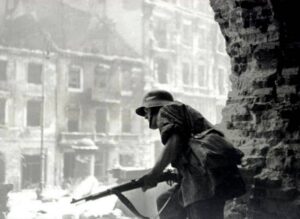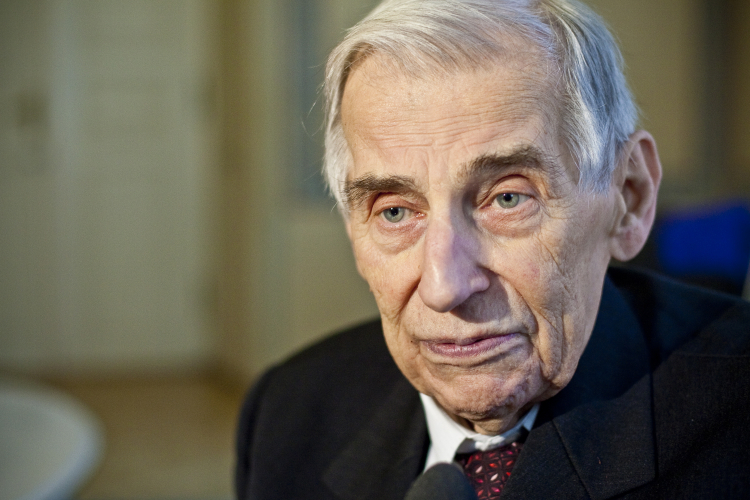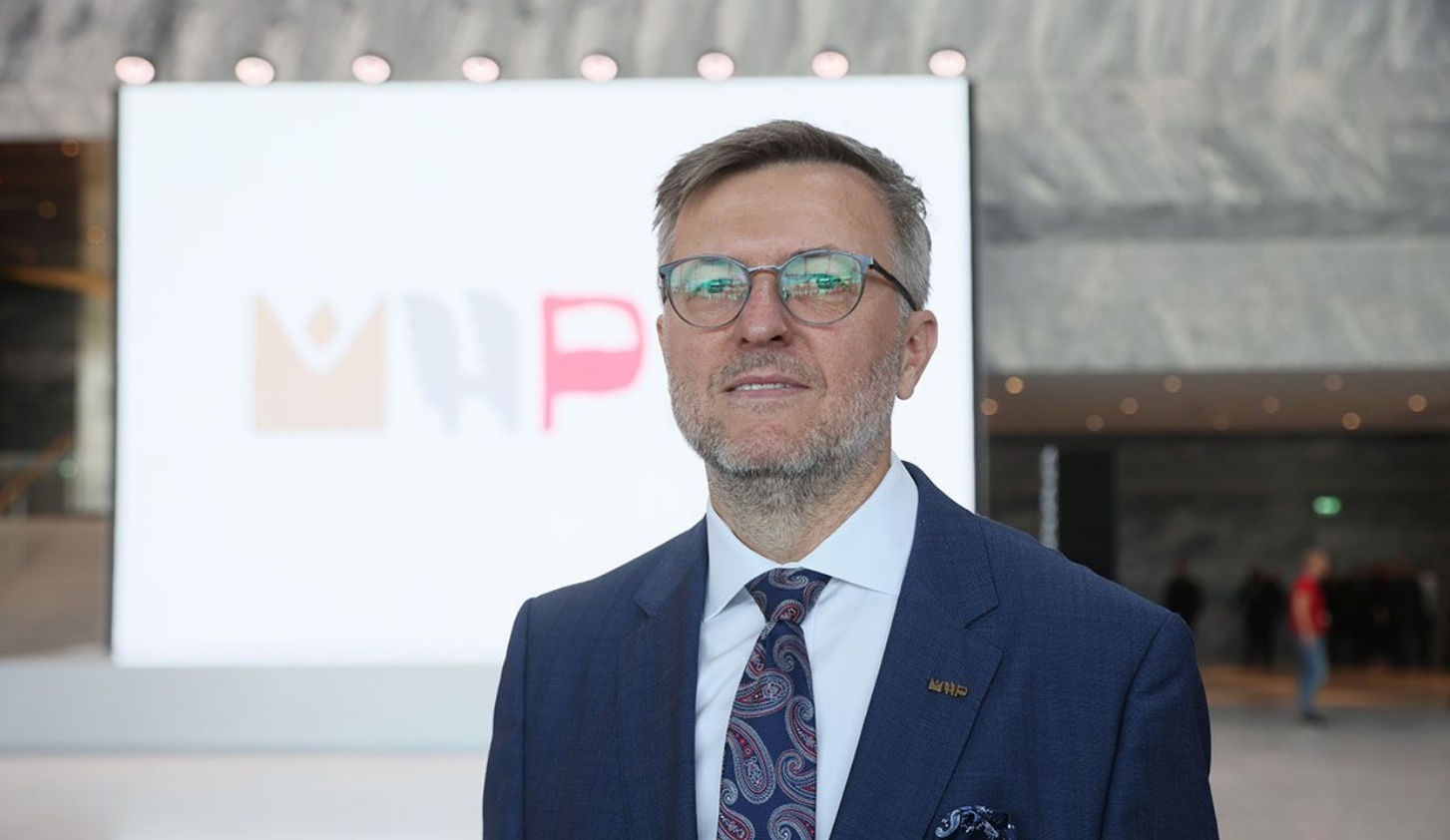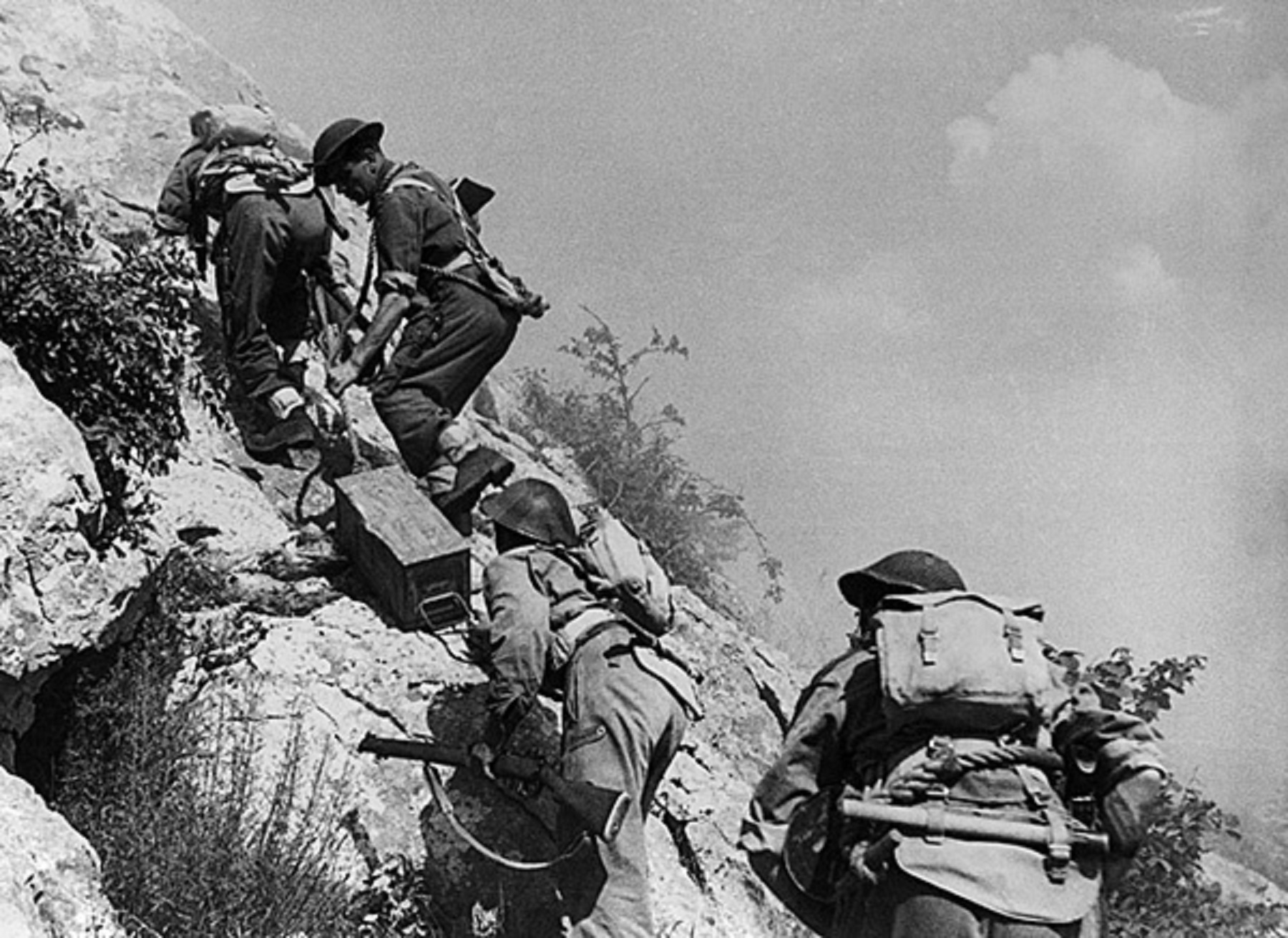He survived the Second World War, the communist period and the first years of the formation of the post-1989 Third Polish Republic, while remaining faithful to his values and beliefs. Although consistently defending his principles, he went down in history as a man constantly seeking dialogue and compromise. What shaped Wiesław Chrzanowski and what does his example teach us today? This is what Tomasz Sikorski, PhD, reflects upon.
Natalia Pochroń, Polish History Museum (PHM): ‘Loving life means the same as loving the fight. And loving the fight means the same as believing in one’s mission.’ Wiesław Chrzanowski once called these words by Karol Hubert Rostworowski his life motto. What do they mean in his case? How do they relate to his life?
Tomasz Sikorski: Indeed, Karol Hubert Rostworowski was one of Wiesław Chrzanowski’s favourite writers, although I am not entirely convinced that this was his life motto. In his public life, Professor Chrzanowski always employed another principle, that of ordo caritatis. It stemmed from the teachings of St Thomas Aquinas and Catholic social teachings, and referred to a certain order of mercy. It meant that we firstly have duties to our primary communities – the family and the nation – and only then to secondary ones. This principle overlapped somewhat with what Roman Dmowski once wrote – ‘I am a Pole, therefore I have Polish duties’.
However, as far as Rostworowski’s motto is concerned – how did Professor Chrzanowski understand it? Well, he perceived the fight referred to in those words not so much as an armed act or irredentism, which he approached rather sceptically. For him, it was above all the fight for certain universal principles and values. But not only a struggle. In my opinion, the most important thing in this paroemia is the mission – a certain task that man must fulfil, a mission to preserve these principles and values, as well as to pass them on to future generations. Throughout his life, the Professor attempted to fulfil this mission, and remained faithful to his principles until the end.

PHM: Earlier such principles were passed on to him – by his grandfather who fought in the 1863 January Uprising and his father – a national activist, but also an outstanding engineer and lecturer. What shaped Chrzanowski’s attitude to the greatest extent?
Tomasz Sikorski: It seems to me that a little bit of everything. Wiesław Chrzanowski grew up in a family with strongly patriotic roots. Both of his grandfathers fought in the January Uprising, his great-grandfather on his father’s side – Ignacy Chrzanowski – was a participant of the Spring of Nations. If we were to go even further, his family’s public activity could be traced back to the reign of the last King Stanislaus II Augustus – one of the Chrzanowskis was a member of the mint. Thus, this was a family strongly involved in public and patriotic activities.
It was likely his father who played the greatest role here after all. Originating from Poznań, he had the patriotic gene on the one hand, and on the other, that of a grass-roots social activist. He therefore quite quickly became involved in public activities, although he mainly concentrated on his studies, studying in Berlin, Westphalia and the Rhineland. Later, he took up a post at the university in Lviv, and subsequently in Warsaw. This resulted in the fact that the Chrzanowskis’ home was often visited by eminent representatives of the world of science, but also of national circles. Professor Ludwik Jaxa-Bykowski was a very frequent visitor, for example. Years later, Chrzanowski recalled that he had been a great authority for him. But there were also many other enlightened figures. All of this undoubtedly had a significant impact on the shaping of Wiesław Chrzanowski’s social, public, and political attitude.
PHM: This also bore its fruit at a time of trial – during the Second World War Chrzanowski was heavily involved in underground and independence activities. In what way?
Tomasz Sikorski: Not initially. He became involved in underground activity owing to his younger brother Zdzisław, who was active in the conspiracy movement. On top of that, during his studies, Wiesław participated in many intellectual and social meetings, where, frequently, the subject of conspiratorial involvement came up. All of that brought Władysław Chrzanowski closer to pro-independence activity.
The turning point for him came in the autumn of 1940 when – at the instigation of his friend Jerzy Dawidowski, he joined the Youth of Great Poland, where he was involved in editing the magazine entitled Młoda Polska. Over time, his involvement grew stronger. In the spring of 1942, the Youth organisation – while retaining its autonomy – was incorporated into the National Party, and militarily into the National Military Organisation (Polish acronym: NOW). Chrzanowski completed a military course at the time, becoming a NOW soldier. Finally, in March 1943, he became vice-president of the Polish Academic Youth Committee and president of the National Committee of Lawyers. This coincided with the timing of the Warsaw Rising.

PHM: What was Wiesław Chrzanowski’s attitude towards this insurgence?
Tomasz Sikorski: The issue of the Warsaw Rising was highly divisive within the entire national milieu from which he originated. The most controversial, of course, was the dilemma around whether or not the uprising should break out. Some activists were sceptical about it and Wiesław Chrzanowski was one of them. Professor Chrzanowski never concealed his negative attitude towards this revolt. There were at least two reasons behind this. The first was of an ideological nature. Chrzanowski believed that if the uprising ended in defeat, it would lead to the disappearance of the elite of the future Polish state – regardless of whether it would be fully free or not.
The other reason was personal. Wiesław’s brother, Zdzisław Chrzanowski, had been executed by the Germans in March 1944. For Wiesław, this was a very powerful experience. Therefore, it is not surprising that, when the idea of launching the insurgence appeared a few months later, he approached it with great scepticism. He feared that, as a result of the uprising, the country’s elite would perish, and the year 1944 would mark the end of the heroic Generation of Columbuses. In a sense, he was right – the national fabric was badly damaged as a result of this insurgence. After all, most of the soldiers of the Warsaw Rising were young people, only just entering adulthood, promising writers and poets, but also already eminent – such as Baczyński and many others. Unfortunately, many of them died.
PHM: Nevertheless, Wiesław Chrzanowski took part in the uprising.
Tomasz Sikorski: True, although it was mainly out of a sense of duty towards his homeland. He joined the revolt as a soldier of the NOW-AK (National Military Organisation-Home Army) ‘Gustaw’ battalion, and he subsequently fought in the ‘Harnaś’ battalion. Although Chrzanowski opposed the uprising, it was of high significance for him. Throughout the era of Polish communism, he maintained contact with the insurgents, helping them in many matters, and organising charity collections. Even years later, in the Third Republic, he did not forget about the uprising. He set himself the goal of keeping the memory of this heroic event alive, and consistently pursued it throughout his life.
As for his personal participation in the insurgence, his approach was completely different. I had the opportunity of talking to the Professor many times. When it came to the topic of the uprising, he would only consider why it should not have happened. If I attempted to find out how it had gone and what role he had had in it – he would avoid answering. It was a traumatic subject for him in a way.

PHM: During the communist period, Professor Chrzanowski was arrested several times, in one sentence the reason was indicated as ‘formally legal activity, but in fact aiming at overthrowing the system’. What – in the eyes of the communist authorities – did this strive to overthrow the system consist in? What did the Professor’s opposition activities look like?
Tomasz Sikorski: Once the Second World War had ended, Wiesław Chrzanowski, like many people of his generation, faced a dilemma – become involved in public life or concentrate on studies and scientific work? He did both.
From the summer of 1945, he became involved in the activation of the All-Polish Youth. In addition to this, he edited the journals Wszechpolak, Akademik, and many others, as well as being active in the Fraternal Aid of the Jagiellonian University. So his public involvement became quite considerable. With all this, he also tried to continue his studies. At that time, he prepared his doctoral dissertation, which was, incidentally, very interesting – concerning the political movements of the late 19th century within the context of the formation of the modern nation. In it, Wiesław Chrzanowski attempted to examine to what extent 19th-century political movements could remain relevant also in post-war reality. Unfortunately, it never appeared in print.
It seemed that everything was going well – an academic career coupled with social activity. And so it likely would have, had it not been for the coordinated surveillance of the youth circles of the National Party. This took place in the spring of 1946. As a result, several activists were arrested, and less than a month later, Chrzanowski was also detained.
PHM: Although not for long?
Tomasz Sikorski: Correct, he managed to survive and was soon released from the Security Office, mainly because he used a fictitious name – Tadeusz Maciński. After leaving detention, he made an attempt to leave the country. Ultimately, however, this did not materialise – he was likely persuaded to stay in Poland by Tadeusz Maciński aka Prus, his superior from the time of the German occupation. When the communist authorities announced an amnesty in 1947, Chrzanowski came out in the open and began cooperating with the Tygodnik Warszawski weekly. A new stage in his life had begun. Unfortunately, it was not free of surveillance. Despite his release from detention, he remained in the circle of interest of the Security Service (Polish acronym: UB), as a result of which he found himself in Stalinist prisons several more times.

PHM: Chrzanowski had a decidedly negative view of communist rule in Poland, and yet in 1954 – shortly after his release from prison – he became involved in the activities of the PAX Association. Why?
Tomasz Sikorski: With the PAX Association it was a very limited episode. Bolesław Piasecki tried to lure Chrzanowski into it as early as 1945. At that time the Professor refused – I do not quite know for what reasons. In 1945, it was not yet clear what direction the PAX association would take, that it would attempt to seek out a dialogue between Marxists and Catholics. It seems to me that it could have been about a personal dislike of Piasecki, who was associated with the pre-war Falanga National Radical Camp. Chrzanowski distanced himself from the views of that organisation.
However, upon his release from prison in 1954, the situation changed significantly. It was difficult for people like him to find their way in the new reality. They were recognised on the streets as heroes, but that was the end of it. They had no jobs or prospects for the future. This situation was exploited by Piasecki, and he reached out to him a second time. He promised to provide him with a job, but on the condition of stronger involvement in the PAX Association. This time Chrzanowski agreed to the proposal – he agreed to help as a legal advisor in the PAX Association and to edit articles printed in Słowo Powszechne and Dziś i Jutro. However, this lasted only several months.
When Piasecki’s famous article ‘The State Instinct’ – in which the author sided with the conservative party hardliners – appeared, they parted ways. However, Chrzanowski maintained lifelong contacts with people from PAX. Although they did not share common views, they were united by their wartime experiences.
PHM: As far as views are concerned – Wiesław Chrzanowski originated from the nationalist milieu, he was heir to and continuator of the political vision developed by the national democratic camp. He understood perfectly well, however, that the precise recreation of the National Democracy formula in the reality of the Polish People’s Republic was doomed to fail. In what form, then, did he want to put it into practice? What did his vision of Poland look like?
Tomasz Sikorski: Throughout his life, Wiesław Chrzanowski was faithful to the tradition of the national movement, but – what is important – he was not its blind epigone, and he did not accept it without criticism. There were several issues that he was openly opposed to – one of the most important being the negative attitude to national minorities, mainly anti-Semitism. Chrzanowski firmly rejected it throughout his life. Apart from this, there were also some aspects he proposed to reform.
Wojciech Wasiutyński, a friend of Chrzanowski, once said that political thought is not the Church. For in the Church there were certain rules which could not be broken, or we would be excluded from it. In politics, on the other hand, it was possible, and even necessary, to revise certain beliefs preached earlier, because, in other moments in history, they may lose their relevance, becoming anachronisms.
Wiesław Chrzanowski believed the same. Already during the Second World War, he strived to build a broad centre-right, which would combine various currents of political thought – Christian-Democratic, Christian-national, national and even conservative. The common denominator was to be Catholicism, but not that proposed by Dmowski, referring to the traditional image of the Pole as a Catholic, but based on Catholic social teachings. All this, of course, without renouncing the national-democratic way of political thinking.

PHM: The Christian National Union (Polish acronym: ZChN) was to be such a group?
Tomasz Sikorski: Yes. The origins of this party can be found in circles connected first with the Young Poland Movement, and then with the team of Polityka Polska, a magazine published by the Movement. Its members were united by a common conviction that a broad Christian-national camp could be built, united by common principles. However, this conviction was shaken in the mid-1980s. The Young Poland Movement split into two currents at that time. One began to seek dialogue with circles far removed from the views of Catholic social teachings – the leading figure here being Tadeusz Mazowiecki. The other current, headed by Marek Jurek, remained faithful to this teaching, sharing Chrzanowski’s orientation. In 1989, these two currents diverged completely – the Christian-National Union was formed from the latter.
PHM: What type of public support did Chrzanowski’s party have?
Tomasz Sikorski: Initially quite a lot. For the first years of its existence, until 1993, the Christian National Union was a significant political force. It is enough to look at the results of the 1991 parliamentary elections. ZChN, then running in a broad coalition under the name of the ‘Electoral Catholic Action’, gained 49 seats in the Sejm and nine in the Senate. This was one of the highest results among the 58 parties vying for election. With such a polarised and diverse political scene, this was undoubtedly a major success.
PHM: Chrzanowski believed that, in order to discuss the future, we should answer three questions: what kind of democracy we aspire to, what kind of capitalism we want, and what kind of Europe we desire. What answers did he propose?
Tomasz Sikorski: This is quite a broad topic, Professor Chrzanowski referred to these issues on many occasions. However, some key principles can be identified here. As far as democracy is concerned, he considered it on several levels. The lowest one was political democracy – here the strong role of national representation in the form of the Sejm and political pluralism were crucial for him. Then there was democracy at the local-government level – Chrzanowski was an advocate of state decentralisation. However, in his opinion, it could not lead to federalisation – in the 1990s there were ideas of dividing Poland into autonomous regions, following the example of the United States, and the Professor was strongly opposed to this. However, he firmly emphasised the power of self-government – regarding it as a school for raising local patriots.
He went on to distinguish democracy at the professional and economic level, realised by building self-governing organisations with the right to represent themselves. And finally there is democracy at the international level – the most important thing here for Chrzanowski was to respect the subjectivity of all the countries within the European community, treating them on equal terms.

PHM: How did this relate to the concept of a United States of Europe, popular in the 1990s?
Tomasz Sikorski: Chrzanowski strongly opposed this concept. He believed that there was no chance of maintaining a federalised Europe or a two-speed Europe. Professor Chrzanowski always said that European integration was not only formal, legal, economic or institutional integration. It was, above all, integration in the sphere of values, building a Europe based on common principles, drawing on Roman, Greek, Judaic and Christian traditions. It was a Europe of sovereign states and sovereign nations. In this aspect, he referred directly to the views of Pope John Paul II or Charles de Gaulle. It is worth emphasising that Professor Chrzanowski was by no means a critic of integration and the European Union itself. He merely took a very realistic approach to how it should function.
PHM: And as far as capitalism is concerned, what was Chrzanowski’s view on this issue?
Tomasz Sikorski: Like the ZChN as a whole, Chrzanowski approved of capitalism, but under certain conditions. He did not reduce this concept to a free market economy only. The three-tier economy model – incorporating the free market, cooperative initiative and the state – was very important to him. While supporting capitalism, he did not want to completely abolish state interventionism. For this reason, for example, he was opposed to privatisation in the form in which it was implemented in 1989– 199.Why?
He believed that, apart from economic processes, the situation of the people affected by those processes should also be taken into account. It seems to me that Chrzanowski was in favour of the social market economy model developed by Tadeusz Przeciszewski. This is a free market economy, but with a certain degree of subsidiarity. In this model, the state frees up initiative and seeks to create a civil society, but when that society is not doing well, it intervenes and helps.
PHM: Wiesław Chrzanowski is one of the most important figures of the Polish political scene of several epochs. Why can we recognise him as a great figure, what determines this?
Tomasz Sikorski: It is always difficult to discuss great figures – they simply are great. However, looking at it from a different perspective, let us try to find a politician who would speak negatively about Wiesław Chrzanowski. I do not know of any such person. He received the Order of the White Eagle from President Kwaśniewski, congratulatory letters on his name day and birthday were semt to him by prime ministers of various governments, he was often visited by people who did not share his political views at all. None of this mattered. If one were to look for statesmen in the Third Republic, he should certainly be counted among them.

PHM: Do his views remain relevant today?
Tomasz Sikorski: His views, at least for him, were definitely timeless. Let us remember that Wiesław Chrzanowski was a man who lived in four epochs – the inter-war period, the Second World War, the Polish People’s Republic and the Third Republic of Poland (after 1989). Despite the fact that he preached his views in changing times, his beliefs did not change – they were always based on the same principles, they never became outdated, never blindly imitated what Chrzanowski’s ideological predecessors did. He referred to this lineage, but tried to creatively re-read it.
Are these views relevant today? Of course they are – but for whom? For publicists, lecturers, people on the margins of politics. Unfortunately, today’s political parties do not at all reach to the way of thinking represented by Wiesław Chrzanowski. They are eclectic, concentrated around the popularity barometer, and do not have any vision of the construction and development of the Polish state. This is what Wiesław Chrzanowski wished to prevent.
PHM: What do you find most valuable about Chrzanowski, the most important thing to follow?
Tomasz Sikorski: I can certainly pinpoint many things in that context. One is the attitude of a modern patriot, who had a great political sense as well as a sense of the moment. Wiesław Chrzanowski was always able to take the right side – both in the times of the Second World War and in the period of the Polish People’s Republic or already in post-1989 Poland. For that reason, the most difficult time in his life was undoubtedly the year 1992, when he was put on Macierewicz’s list of those accused of cooperation with the SB. He – a man who had never built any barriers, even towards political opponents, and had always been very autonomous in his beliefs – was accused of such a thing. He took this very hard, it was a huge blow to him. However, he accepted it extremely humbly – this is another thing that should be strongly emphasised.
Wiesław Chrzanowski was always characterised by great humility and modesty – I experienced it more than once while meeting with the Professor. When I once talked to his family, it turned out that, through to the end of his life, he was a very socially involved person – helping orphans, the needy, veterans of the Warsaw Rising. However, he never spoke about this publicly. May we live to see politicians with such class today.

PHM: Wiesław Chrzanowski comes from the Generation of Columbuses – people for whom the period of entering adulthood fell during the Second World War. What does it teach us today? In what aspect is it the greatest challenge for us?
Tomasz Sikorski: This generation was formed at a time when nobody expected war to break out. When it did happen, they rose to the challenge and went down in history as a symbol of courage and heroism. How would young people behave today? We do not know, and may we never have the opportunity to find this out.
But what can we learn from the Generation of Columbuses? First and foremost, two things – to rise to the occasion as the need arises, just as young people did nearly eighty years ago. And secondly – to always be true to your principles. Because, despite the changing circumstances, universal values remain unaltered. Wiesław Chrzanowski proved so in the best possible way.





